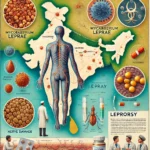Raja Ram Mohan Roy (1772–1833) was a prominent Indian social reformer and intellectual who played a crucial role in the socio-cultural transformation of India during the early 19th century. Often referred to as the “Father of Modern India” and the “Father of the Indian Renaissance,” his efforts laid the groundwork for numerous social, educational, and religious reforms in the country.
Early Life and Education
- Birth and Background: Raja Ram Mohan Roy was born on May 22, 1772, in Radhanagar, Bengal (now in West Bengal, India), into a wealthy and orthodox Brahmin family.
- Education: He was well-educated, studying Persian, Arabic, and Sanskrit, which gave him access to a wide range of religious and philosophical texts. He also learned English, which allowed him to engage with Western ideas and literature.
Social and Religious Reforms
- Opposition to Sati:
- Sati was the practice of a widow immolating herself on her husband’s funeral pyre.
- Roy campaigned vigorously against this practice, arguing that it was inhumane and had no basis in true Hindu scriptures.
- His efforts were instrumental in the British government’s decision to ban Sati in 1829.
- Advocacy for Women’s Rights:
- He fought for the rights of women, advocating for widow remarriage and women’s education.
- Roy believed that women’s empowerment was essential for the progress of society.
- Abolition of Polygamy and Child Marriage:
- He criticized practices like polygamy and child marriage, promoting a more rational and equitable approach to marriage and family life.
Educational Reforms
- Establishment of Educational Institutions:
- He founded the Hindu College in 1817 (later known as Presidency College) in Kolkata, which aimed to combine Western and Indian learning traditions.
- He also established the Anglo-Hindu School in 1822 and the Vedanta College in 1826 to promote modern education and scientific thinking among Indians.
- Promotion of English Education:
- Roy advocated for the introduction of English education in India, believing that Western scientific and rationalist thought could help modernize Indian society.
- He emphasized the importance of learning English for accessing advanced knowledge and fostering intellectual development.
Religious Reforms
- Brahmo Samaj:
- In 1828, Roy founded the Brahmo Sabha, which later became the Brahmo Samaj, a monotheistic reform movement within Hinduism.
- The Brahmo Samaj aimed to purify Hinduism by removing idolatry and superstitious practices, promoting a belief in a single, formless God.
- It encouraged a rational and ethical approach to religion, drawing on the Upanishads for inspiration.
- Interfaith Dialogue:
- Roy engaged in dialogues with other religious traditions, including Islam and Christianity, seeking to find common ground and promote mutual respect.
- He translated religious texts like the Vedas and Upanishads into English and Bengali, making them accessible to a broader audience.
- India art and culture: Indian paintings

- Indo-Islamic Architecture: A Blend of Cultures

- leprosy : Also known as hansen’s disease

Political and Economic Thoughts
- Advocacy for Political Rights:
- He was an early advocate for political liberties and freedom of the press in India.
- Roy argued for greater self-governance and more involvement of Indians in the administration.
- Economic Views:
- He criticized the economic policies of the British government that exploited India’s resources and led to widespread poverty.
- Roy called for economic reforms that would benefit the Indian people.
Legacy
Raja Ram Mohan Roy’s contributions had a lasting impact on Indian society and the broader struggle for social justice and modernization. His efforts helped lay the foundation for future social reform movements and set the stage for India’s renaissance in the 19th and 20th centuries.
- Recognition: He is widely respected and commemorated in India for his progressive views and relentless efforts to reform society.
- Memorials: Several institutions and streets in India are named after him, honoring his legacy and contributions to the nation.
Roy’s life and work exemplify the spirit of intellectual inquiry, social justice, and cultural renaissance that continues to inspire generations.




